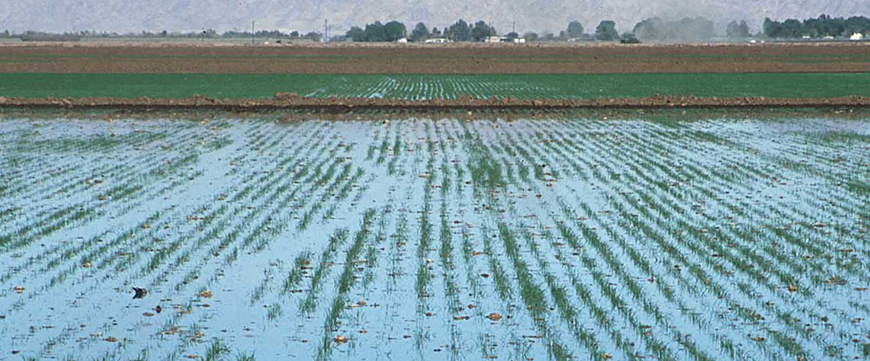06.10.2016: The effects of flood events on agriculture only received limited attention so far. A new study by a team of GFZ scientists from the section Hydrology, in cooperation with a colleague from the Hessian State Office for Agriculture, assesses the risk for several agricultural crops. Within a risk map the scientists present the regions and crops that are especially endangered.
Already in 2007, the European Commission demanded in its Flood Risk directive that flood risks for Europe are mapped on large-scale. Knowledge about the risk potential is crucial for policy makers, regional disaster management planning, and in the (re-)insurance industry. Even if there is increasing demand for these kinds of maps, some sectors, among them the agricultural sector, did not yet receive much attention. Within their study "Large-scale, seasonal flood risk analysis for agricultural crops in Germany", published in Environmental Earth Sciences, the scientists working with the lead author of the study Stefan Klaus, present the risk for several crops in Germany. Klaus writes his master thesis at the GFZ and the University of Potsdam.
During a flood event the damage in the agricultural sector is relatively small compared to, for example, the building sector. However, comparatively “harmless“ floods can already lead to total losses of farmland. Unlike settlements, farmland is often only protected against rather small floods.
Agricultural crop losses depend strongly on the season
Within their new study the scientists use an agricultural crop loss model for crop susceptibility analyses. They identify three specific regions of risk for Germany. The differences result from seasonally differently expressed flood risks and from the highly seasonal pattern of cultivation of different field crops. Crops are the most vulnerable shortly before harvest since the costs caused by the flood damage are the highest. Due to the already invested costs of maintenance the loss is at its maximum during this time, in case no second planting effort can be started with the seasoning processing. In case of early season, a second planting effort may be possible.
A frequency analysis of floods shows that the western part of Germany is mainly in danger of large-scale and prolonged flooding during winter. The East is also threatened by winter floods but, additionally, floods are also quite frequent in spring and summer. In the South of Germany floods are the most frequent during the time of snow melt as well as during the summer months. This high flood probability in the East and South leads to a high agricultural risk, since the floods may be linked to total crop failure.
Canola and potatoes are most vulnerable in the South
Stefan Klaus: „When choosing the type of crop, the flood risk should be considered, to keep the level of damage for agriculture low.” Since canola has a long planting and harvesting season, there is a maximum statistical danger for this plant. Further, these plants are already in danger when the flooding is only of short duration. Another crop with a high risk for the South and East of Germany is the potato. Its harvest time coincides with high risks of summer floods. Its cultivation is rather secure in northwestern Germany with only low risks of summer floods. Hence, canola and potatoes shall rather not be cultivated in southern Germany. (ak)
Klaus, S., Kreibich, H., Merz, B., Kuhlmann, B., Schröter, K., 2016. Large-scale, seasonal flood risk analysis for agricultural crops in Germany. Environmental Earth Sciences, 75: 1289. DOI: 10.1007/s12665-016-6096-1








![[Translate to English:] Torsten Sachs in front of a climate station on a field](/fileadmin/_processed_/3/9/csm__TorstenSachs_bearbeitet_GS_4a1365ef84.jpeg)

![[Translate to English:] left image flood at the Ahrtal: image from above, several houses are flooded; left image:: Heidi Kreibich;](/fileadmin/_processed_/4/4/csm_Bild2_9af0130e9f.png)



![[Translate to English:] Start der Vega Rakete](/fileadmin/_processed_/6/4/csm_20231201-kachel_Vega-VV23-launch_ESA-CNES-Arianespace_706716b68c.jpeg)









![[Translate to English:] Poster exhibition at the Brandenburg Hydrogen Day at the GFZ, some participants in the foreground](/fileadmin/_processed_/6/5/csm_Erster_Brandenburgischer_Wasserstofftag_GFZ_402fcec95e.jpeg)
![[Translate to English:] Group picture of the participants](/fileadmin/_processed_/9/4/csm_20231108_CAWa-Workshop-Tashkent_Gruppenbild_99ea779d8a.jpeg)

![[Translate to English:] [Translate to English:] Hörsaal](/fileadmin/_processed_/e/6/csm_H%C3%B6rsal_e21ac645fb.jpeg)


![[Translate to English:] The Delegations in the Historic Library on the Telegrafenberg. In the back there are from left to right, the Dutch Ambassador for Germany, Ronald van Roeden, the Dutch Minister for Education, Culture and Science, Robbert Dijkgraaf and the scientific director of the GFZ, Susanne Buiter.](/fileadmin/_processed_/d/b/csm_Kachel-2_9eba4b4212.jpeg)

